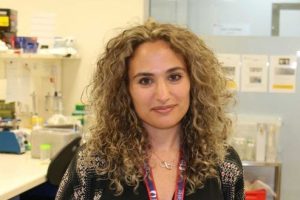To mark Sleep Awareness Week 2019, we spoke to Dr Stephanie Yiallourou, a scientist at The Baker Heart & Diabetes Institute who is investigating the role of sleep in cardiovascular disease risk.

Dr Stephanie Yiallourou
How did you become interested in sleep and its role in cardiovascular disease risk?
“I completed my PhD investigating mechanisms of Sudden Infant Death Syndrome, and as part of this I explored heart rate and blood pressure dynamics during sleep. It was these studies that fostered my interest in sleep and cardiovascular control, and its role in cardiovascular disease (CVD).”
What’s the link between the two?
“Poor sleep at night (having short sleep duration or fragmented sleep) is associated with increased risk of CVD.”
What’s surprised you most in the research you’ve done so far?
“That little sleep research has been performed in vulnerable populations that are at particularly high risk of CVD, such as Indigenous Australians and those living in regional communities.”
What are some of the other diseases or conditions that can be impacted by poor sleep?
“Poor sleep at night is associated with many health problems. For example, poor sleep is associated with increased risk of hypertension, obesity and diabetes. We also know that poor sleep is strongly associated with mental health problems such as depression and anxiety.”
Why is sleep so important for all of us?
“Good sleep is vital for both health and well-being. When we don’t get adequate sleep at night, all other domains of health are negatively impacted. Conversely, when sleep health is improved, gains in general physical and mental health ensue.”
Have any of your habits changed as a result of what you’ve learnt from your research?
“I aim to get the recommended amount of sleep at night (between 7-9 hours) as well as going to bed at the same time every night. For my children, I try to maintain a good, regular bedtime routine – they go to bed at the same time each night, avoid digital devices and the hour before bed is reserved for quiet time.”
What are some of your top tips for improving sleep – particularly for busy researchers and scientists!
“Try to get at least 7 hours of sleep at night! Put your laptop away at a decent hour. You may find you’ll discover the solution to your problem after a good night’s sleep, as sleep is vital for memory formation and executive functioning.”
What keeps you motivated?
“Of course it is a commitment to reduce the burden of CVD and improve health and well-being. Closing the gap between health inequity, particularly between Indigenous and non-Indigenous Australians also resonates strongly. However, it is also the participants involved in my studies, my family, friends and work colleagues who motivate me.”
What’s coming up next for you?
“While we have identified a link between poor sleep and cardiovascular disease risk, the underlying mechanisms remain unclear. I am collaborating with Professor Vaughan Macefield at the Baker Institute to investigate the role of the sympathetic nervous system as a driver of increased CVD risk in people with poor sleep using state-of-the-art MRI imaging and microneurography.”
Connect with Stephanie on Twitter @SYiallourou or find out more about her research on The Baker Institute website, ABC News or The Courier.
